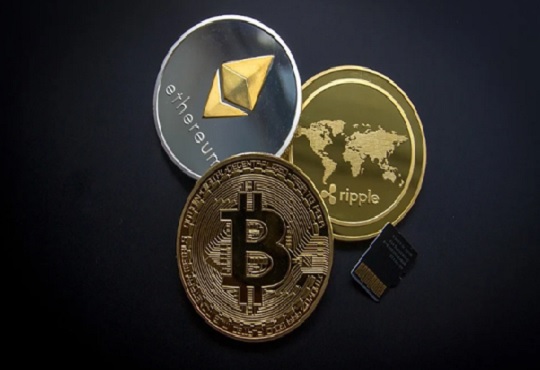Explained: How Different Is Ekrona From The Cryptocurrencies
CIOReviewIndia Team | Thursday, 24 February 2022, 13:09 IST
 The ease of payment with digitalization has reduced the use of cash to a considerable extent. You must have seen 'n' number of people paying via digital modes for daily essentials regularly. From buying an apple to a software product, digital cash has captured a huge market base. On a more broader level, the use of cryptocurrencies and CBDCs (which stands for Central Bank Digital Currency) have become quite popular these days.
The ease of payment with digitalization has reduced the use of cash to a considerable extent. You must have seen 'n' number of people paying via digital modes for daily essentials regularly. From buying an apple to a software product, digital cash has captured a huge market base. On a more broader level, the use of cryptocurrencies and CBDCs (which stands for Central Bank Digital Currency) have become quite popular these days.
Where cryptos enjoy the liberty of being a decentralized form of currency, CBDCs comes with more security due to being under government regulation. But at the same time, we can't get away without considering the highly volatile nature of the cryptocurrencies like bitcoins.
Since cryptos are decentralized, they always have an associated risk of being utilized for nationwide or coss-territorial illicit purposes.
As a reaction to the progressive investments in bitcoins and other similar cryptocurrencies, the Sveriges bank did come up with the concept of its own centre-held e-currency- eKrona. It is a digital version of cash that is regulated by the central bank of Sweden. The payment mode is based on the blockchain system, and the database will be kept with the country's central bank itself.
In this article, we've stated some points of differences between CBDCs (like eKrona) and Cryptocurrencies (like bitcoins).
DIFFERENCE BETWEEN CRYPTOS AND CENTRAL BANK DIGITAL CURRENCIES (CBDC)
Both cryptocurrencies and CBDCs have their own distinguished attributes. Though the track of trading-related transactions would be maintained on common blockchain ledgers, both currencies are very much different.
- Regulations: This is the primary difference between cryptos and CBDCs. Cryptocurrencies are known for being decentralized (which is why they are the center of attraction for most of the investors), which maintains the anonymity of the investor, whereas CBDCs are fully regulated, government-held currencies that are highly influenced by the policy formulations from the country's official authorities.
- Value Stability: Cryptos do not have a stable value rate. This is so because any autonomous body does not regulate them, and this is why cryptos have high risks associated with their name compared to that of CBDCs. CBDCs like eKrona are more stable and don't have as much risk as that cryptos.
- Database Keeping Or Recordkeeping: The database is kept on an electronic ledger-based system called the blockchain. The difference is that in the case of cryptos, the data is displayed on a private or decentralized technology-based ledger, whereas the transaction-related details are in knowledge of the bank, the sender, and the receiver in the case of CBDCs.
- Encryption: Cryptocurrencies employ a strong encryption method already in place. CBDCs have to be secured by strong passwords in order to protect financial details like debit and credit card details, PIN, OTPs, etc.
- Fiat Money Resemblance: CBDCs can be said to have the power to perform functions of the fiat currency in an economy. They can be declared as fiat currency after being properly evaluated for feasibility, as Sweden is currently doing. Its centre-held eKrona is under evaluation. But, cryptos are not a form of fiat currency; in fact, bitcoins and other alike cryptocurrencies are nowhere near being fiat currency for a country, the reason being they are not centralized and also are not regarded with the capacity to become the legal tender.
Since the percentage of cash transactions in Sweden is negligible (hardly around 2%), it looks like it won't be that much of a big issue for the citizens to adopt the eKrona as a legal tender. However, there is one major aspect that might be an obstacle in the path of announcing this Swedish e-coin as the country's legal tender. Read further to know about that.
The Riksbank has to follow some criteria and work on prescribed standards that are stated under the Riksbank Act. This is the way any prime body or institution in a country works. But the noteworthy thing is that as per the regulations of the act, Riksbank has to mention about the party it is dealing with.
In addition to this, the act does not provide any clear manifestation regarding whether the Riksbank can keep the ‘public deposits’ directly with itself or not. Further, it is listed in the act from which institutions or companies the Sveriges Riksbank can accept deposits. However, the bank is authorized to keep collateral against credit issuance. This means if the Swedish bank wishes to formulate the usage of its newly introduced e-coin, it either has to amend the act or completely go for a new framework, which is easier said than done.
AN IMPORTANT ANGLE: TAXATION & CBDCs
Tax is a crucial component of the finance policy of every country. With the introduction of CBDCs like eKrona, it will become almost impossible to exercise methodologies for tax evasion. This is a very impressive attribute of the CBDCs as many people opt for such tactics, which help them evade the actual tax portion, thus increasing the amount of black and illicit money in the economy.
It'll be easier for the government to keep a check on the transactions and taxes (accordingly).
A QUICK LOOK ON THE GO
The Swedish e-coin that is at present being evaluated from every aspect (tests or evaluations are divided into ‘phases’) can be soon booked under the title of "legal tender." Those who are looking forward to investing in this e-currency must be careful while choosing the platform. The eKrona platform is a licensed platform where you can buy and trade this new-age Swedish invention. The platform is easy to use, and no fee is charged for trading.
In some countries, the reason for the issuance of CBDCs is the non-access of privately-held e-payment modes or platforms for the general public, whereas, in others, the reason that gave birth to this new-era regulated digital currency is the attempt to counter the situation of financial instability.
While this creation of the Sveriges Riksbank is undergoing the process of evaluation, people are waiting to see what the future holds for them.




